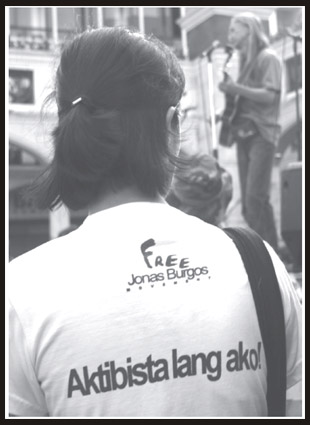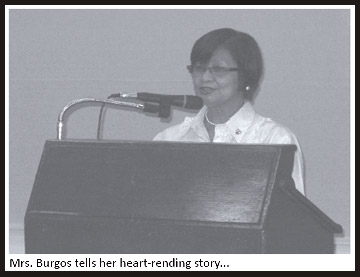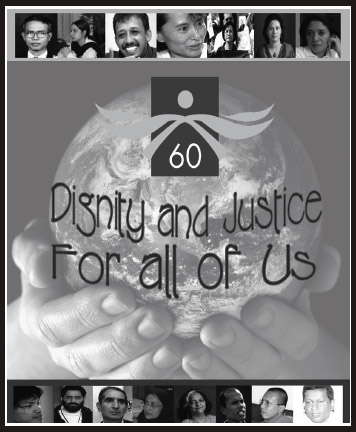Eleven Years of Trials and Triumphs
Towards a
World Without Desaparecidos
a public forum on the phenomenon of enforced
disappearances in the Philippines
Bulwagang Sala’am, University of the Philippines Asian Center
4 June 2009
Greetings!
 Last
week I was in the province to visit my mother. Seated by the window on the
bus, waiting for it to leave for the city, I watched a young man, in his
thirties, saying goodbye to his young daughter, about 7. It seemed as if
he was asking his parents to take care of his daughter. Then when the
driver gave the signal that the bus was about to leave, this man cupped
his mother’s face with both his hands and planted a kiss on her forehead.
The mother in turn caressed her son’s cheek to acknowledge the kiss. The
impact of this scene which took no more than 10 seconds was so much that I
could not stop the tears from streaming down my cheeks. You see, that is
the way Jonas would say goodbye when he left the house and I would also
touch his cheek to tell him he must take care.
Last
week I was in the province to visit my mother. Seated by the window on the
bus, waiting for it to leave for the city, I watched a young man, in his
thirties, saying goodbye to his young daughter, about 7. It seemed as if
he was asking his parents to take care of his daughter. Then when the
driver gave the signal that the bus was about to leave, this man cupped
his mother’s face with both his hands and planted a kiss on her forehead.
The mother in turn caressed her son’s cheek to acknowledge the kiss. The
impact of this scene which took no more than 10 seconds was so much that I
could not stop the tears from streaming down my cheeks. You see, that is
the way Jonas would say goodbye when he left the house and I would also
touch his cheek to tell him he must take care.
This is how it is among us families of victims of
enforced disappearance. One moment we are ‘normal’ doing what we are
doing, then the next moment, something touches the heart and triggers an
assortment of emotions. . . then we are dazed into stillness, tortured by
thoughts of our missing.
It seems just like yesterday when the family was shocked
by the abduction of Jonas. The hundred and one depths, lows and extremes
of rollercoaster-like emotions remain fresh. The pain, the fears, the
sorrow still are present, but through the days, weeks, months, years, we
have been given the grace to develop new eyes. . . much like sight of the
heart and not the vision of our eyes.
 Today,
on the 37th day of the third year of Jonas’ abduction, I try to read or
hear God’s language in what has happened.
Today,
on the 37th day of the third year of Jonas’ abduction, I try to read or
hear God’s language in what has happened.
John of the Cross wrote “The language of God is the
experience God writes into our lives.” Man’s sinfulness has caused
enforced disappearances and all human rights violations, not God. Yet, in
the events that has happened, the abduction of Jonas, our search, the
people we have met, the discovery that there are hundreds like us who are
victims, there must be something that God is saying to me and the family.
We, the family, as farmers have a vantage point of
looking at things. It is not an accident that the rains came at the wrong
time and consequently our rice harvest was very poor. It is not an
accident that we harvested more than 3 tons of mangoes in our small farm
but the price was very low, we practically broke even. It also, is not an
accident that Jonas is not around, now that the farm has difficulties, and
he would have known what to do.
Today, because our God is generous and has blessed us
with different eyes, we refuse to be influenced by an unhealthy fatalism
that says “ants die when they fight elephants or we cannot win against
giants.” Thus we continue our search, we continue to seek justice.
Today, as we go through day to day ordinary things,
missing Jonas, longing for his embrace, we
ask ourselves “ What is God saying to us in these ordinary things?”
This particular stanza in St. Teresa of Avila’s poem
“In the Hands of God,” is an example of things
which to me is not mere coincidence.
“Be it Joseph chained or as Egypt’s governor,
David pained or exalted,
Jonas drowned or Jonas freed,
What do you want of me?”
Coming across this poem, gave me a taut feeling like
being choked in the heart. You see the day before, a source said he heard
someone say that Jonas was drowned by his captors. Of course we cannot
verify if this is true or not...but to read the poem a day after, while
the information was so fresh...
It has been 10 months and Supreme Court is silent... we
were granted only partial of the writ of Amparo by the Court of Appeals.
We were denied the writ Habeas Corpus. If we are not given these
instruments, these weapons by which we hope to find Jonas, how can we
proceed? And yet we cannot be paralyzed into inaction.
Clearly, to me the message is that we continue speaking
against enforced disappearance. The message is not to be quiet. The
message is to be a voice for the disappeared who cannot talk. It is
precisely this discernment that prompted me to accept the chairmanship of
the Desaparecidos, an organization of the victims and families of
enforced disappearance. And strongly still, the message is to seek Him
with more fidelity in prayer and silence.
So I say as Henri Nouwen says “Mourn, my people, mourn.
Let your pain rise up in your heart and burst forth in songs and
cries...Mourn for the absence of a soft embrace...Mourn for those whose
hunger for justice has brought them to prisons...Think of it as a dark
face of evil that has penetrated every human heart, every family, every
community, every nation and keeps you imprisoned...Cry for freedom, for
salvation, for redemption...” (New Oxford Review, June, 1992)
“Today we must mourn so that we don’t accept as normal,
this hell on earth. . . . to properly cry is to see injustice,
indifference, lack of love and hardness of heart...” (R. Rolheiser,
Against an Infinite Horizon)
I tell you I have been ‘crying properly’ for a long
time now. I mourn with all of you. It is this mourning for the
disappearance of Jonas that has enlarged my heart. And now I am able to
embrace all. Thanks to Jonas, I can even embrace those who are responsible
for this crime against humanity, enforced disappearance. Yet even as I
embrace them in forgiveness, I pray for justice to be served. I hold them,
the military and their commander-in-chief accountable for my son but it
will not be me who will mete out justice.
I am missing one son but so many have become my sons. I
thank Jonas because his being disappeared has helped me seek God’s will
for me.

Photo credits of The Voice, December 2008 (Vol.VIII,
No. 2) Cover
“60th UDHR Logo” ©http://www.ohchr.org
“Earth” ©http://starrynightlights.com
“Thai human rights defenders (Somchai Neelapaijit, Charoen
Wat-aksorn and
Phra Supoj Suwajo)” ©http://thailand.ahrchk.net
“Aasia Jeelani” ©http://www.ikv.nl
“Munir Said Thalib” ©http://www.indonesiamatters.com
“Aung San Suu Kyi” ©http://www.guardian.co.uk
“Edita Burgos” ©Ilang-Ilang Quijano/http://cameracurse.blogspot.com
“Mandira Sharma” ©http://www.bbc.co.uk
“Suciwati” ©http://www.duaberita.com
“Usman Hamid” ©http://www.flickr.com/photos/pradeepics
“Khurram Parvez” ©http://en.epochtimes.com
“Parvez Imroz” ©Nizzar Ahmad/http://www.ikv.nl
“Angkhana Neelapaijit” ©AFAD
“J.C. Weliamuna” ©http://srilankaencounters.com
“Sunila Abeysekera” ©Patricia Williams/http://hrw.org
 Last
week I was in the province to visit my mother. Seated by the window on the
bus, waiting for it to leave for the city, I watched a young man, in his
thirties, saying goodbye to his young daughter, about 7. It seemed as if
he was asking his parents to take care of his daughter. Then when the
driver gave the signal that the bus was about to leave, this man cupped
his mother’s face with both his hands and planted a kiss on her forehead.
The mother in turn caressed her son’s cheek to acknowledge the kiss. The
impact of this scene which took no more than 10 seconds was so much that I
could not stop the tears from streaming down my cheeks. You see, that is
the way Jonas would say goodbye when he left the house and I would also
touch his cheek to tell him he must take care.
Last
week I was in the province to visit my mother. Seated by the window on the
bus, waiting for it to leave for the city, I watched a young man, in his
thirties, saying goodbye to his young daughter, about 7. It seemed as if
he was asking his parents to take care of his daughter. Then when the
driver gave the signal that the bus was about to leave, this man cupped
his mother’s face with both his hands and planted a kiss on her forehead.
The mother in turn caressed her son’s cheek to acknowledge the kiss. The
impact of this scene which took no more than 10 seconds was so much that I
could not stop the tears from streaming down my cheeks. You see, that is
the way Jonas would say goodbye when he left the house and I would also
touch his cheek to tell him he must take care. Today,
on the 37th day of the third year of Jonas’ abduction, I try to read or
hear God’s language in what has happened.
Today,
on the 37th day of the third year of Jonas’ abduction, I try to read or
hear God’s language in what has happened.